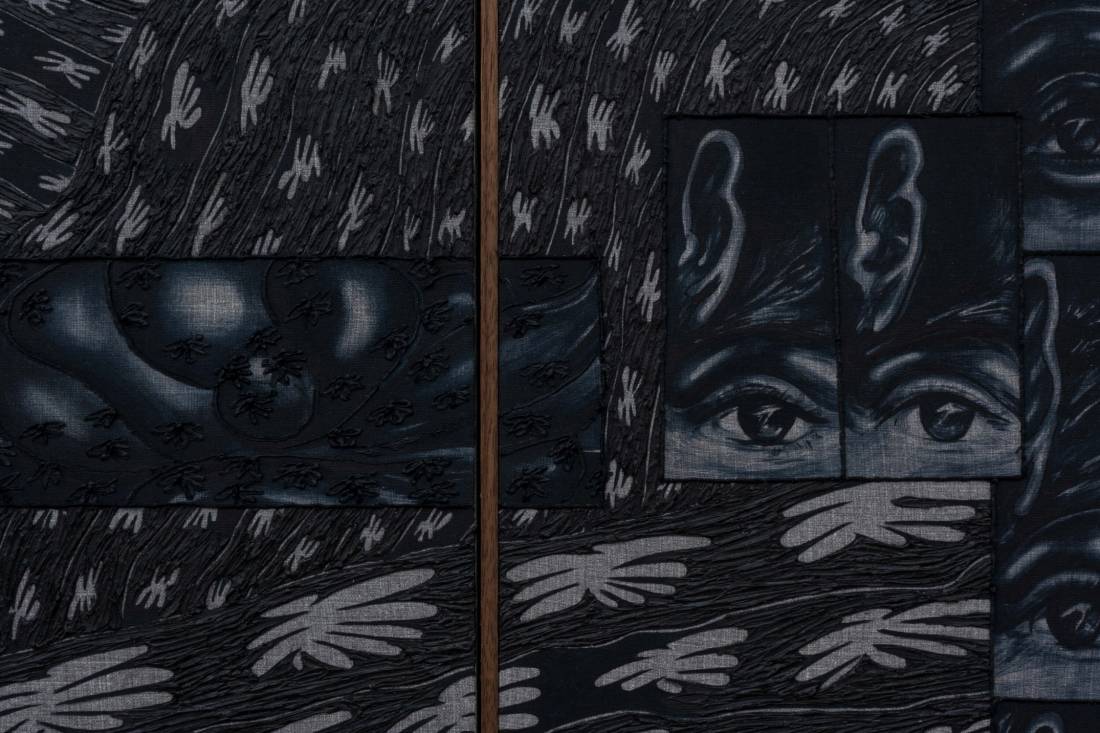Type:
Country:
Venue:
Categories:
Exhibition Type:

Do pilgrims only progress or do they travel backwards too? John Bunyan’s allegory of man’s forward movement towards Zion was taken up as a founding story of travelling to the New World: a religious justification for Europeans’ brutal occupation of America. Yet pilgrimage has since then gone the other way, becoming a search for an authentic self and homeland. Coachloads of white American tourists flock back to Europe in search of roots long since withered. These double meanings of pilgrimage, as locating and dislocating oneself, are mapped out in American artist Emma cc Cook’s new exhibition, inspired by the discovery of her Scottish roots and her ongoing exploration of national identity.
Pilgrim, Cook’s first UK solo show, continues her interest in ‘archaeologies of place’ – specifically America – gathering signs that speak the history and present of a location. But her drawings and paintings show places where the defining features have long since been stripped away. She depicts land zapped by capitalism and mono-culture, in both the agricultural meaning and the sense of a society which only tells one story about itself, raking over all others. Lines upon lines describe the ploughed fields of America’s rural Midwest, where the artist grew up, but they verge upon abstraction and non-representation: they could be nowhere, their essence extracted. Box-like vignettes show images, incidents and artefacts recovered from these sites, but are too fragmentary to coalesce into a single identity. These little squares seem more like cartoon cells or movie storyboards; the country as equal parts fiction and evidence. Her larger paintings and drawings only show objects, standing in for their owners, imbued with their aura, significant but not quite legible, like details in a dream. Perhaps her archaeology is of America’s unconscious.
The lines and grids of her work, including the many wooden frames within frames, belong not only to abstraction and agriculture, but also to the order of the archive. Nodding to the repeating cells of Hanne Darboven’s mammoth index Cultural History 1893-1983 (1983) – an acknowledged influence – with its dizzying mix of the historical and the personal, the artwork and the postcard, Cook tries to piece together the myth of America, and her place in it, through the monumental as well as the humble, neglected or anecdotal. She does this in her painterly borrowings from American folk art, or in her collection of found objects – marginal things which bear a heavy ideological weight. On show are farm implements straight out of Grant Wood’s American Gothic (1930), but which are European in design and made for work now done by disenfranchised immigrants; cowboy ephemera signifying courage and conquest that masks cruelty; or a little brush with a dolls head, gendering virtue. Cook points to the unruliness of the archive, but also how the nation over-organises its citizens. Her work is a grand index of signs right down to her choice to work with mahogany (a wood plundered by colonising Europeans) or canvases in black wool (sourced from Europe). Like Bunyan, the artist might be writing an allegory of homeland, but in this case of the nation as a dark and foolhardy organising principle.
Curator :
Artist:
Emma cc Cook (b. 1989, Minneapolis, USA) lives and works in Austin, Texas. She graduated with a BFA in painting from University of Minnesota and studied classical realism at the Angel Academy in Florence, Italy. Recent solo exhibitions include Flags, Moskowitz Bayse, Los Angeles, California (2022), Peeping Tom, Et Al, Mission, San Francisco, California (2022); The Company, Adams Ollman, Portland, Oregon (2021); Milkman Pigeon, Half Gallery, New York, New York (2021). Recent group exhibitions include Stress tested (curated by the artist), Public Gallery, London, UK (2021); and Resting Point of Accommodation, Almine Rech, Brussels, Belgium (2021). Select residencies include New York School of the Arts at Vytacil and Campos de Gutierrez in Medellin, Colombia. Emma received the MSAB grant, the Carter Prize in Painting and the Gay M. Grossman Memorial Scholarship.
91 Middlesex St
London, E1 7DA
United Kingdom
- 981 reads

